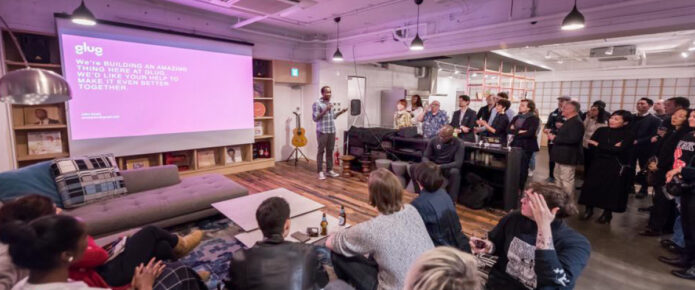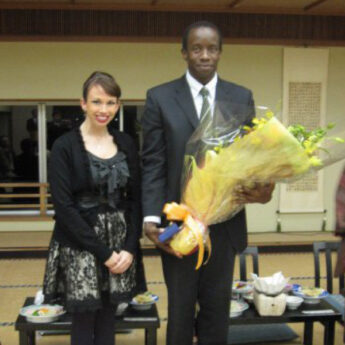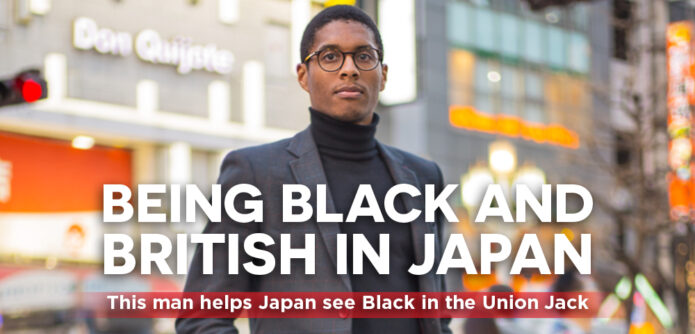Raised in Uganda, Kenya and the UK, I studied postgraduate law at BPP University and received a bachelor’s degree in history at the University of London. When I boarded a British Airways flight to Tokyo back in 2006, I had one plan in mind: to spend a year in Ibaraki Prefecture as an assistant language teacher (ALT) on the Japan Exchange and Teaching Programme (JET Programme), and then return to the UK.

John presenting at a Glug Tokyo event
JET Programme participants are recruited globally by the government of Japan and employed as English teachers in the grammar school system, or as international relations liaisons in prefectural governments around the country.
Fast forward
Fifteen years later I’m still in Japan. I’m no longer an ALT. Rather, I’ve carved out a career as a content creator and an innovation consultant. I wear a number of hats as a content creator in the private and public sectors, as well as in academia: journalist, copywriter, editor and brand communicator.

John in Ibaraki after completing the JET Programme
As a consultant, I work on open innovation projects, enabling collaboration between firms, venture capitalists and start-ups or creatives by matching programmes and creative events. That’s in addition to producing grassroots community platforms that bring together global creatives from various fields.
The upshot is that thoughts of returning to the UK seem far away, unless I can somehow close the circle by finding a way to connect my network in Japan to the UK. I worked in the UK Crown Prosecution Service as a clerical assistant, back when I had dreams of becoming a lawyer in London.
Early stage
I was an ALT for four years in two middle and two elementary schools in Itako City, Ibaraki Prefecture. My next step after the JET Programme was back in 2010. It was then that I transitioned to a new position at the World Intellectual Property Organisation (WIPO), a specialised agency of the United Nations.
WIPO, which is headquartered in Geneva, Switzerland, manages global intellectual property (IP) treaties that cover international patents, copy- rights and trademarks. As it turned out, the agency’s office in Tokyo was looking for a researcher and writer. Two and a half years later, my colleagues and I published more than 200 articles on their website, called IP Advantage, which shows how entrepreneurs use IP in their business strategy.
When that project ended, I started freelancing as a writer but, having no idea what freelancing entailed, I reached into my list of contacts and asked for help. It was then that someone I had met—a director of a British firm in Japan—recommended that I contact Simon Farrell, who is the co-founder of Custom Media, publisher of BCCJ ACUMEN.
In the same period, I reached out to the British Chamber of Commerce in Japan (BCCJ) to see if they could help, and they could. In particular, Lori Henderson, the executive director of the BCCJ, got back to me and recommended possible steps forward.
Growth stage
My first freelancing gig was for BCCJ ACUMEN and The ACCJ Journal, the monthly business publication of the American Chamber of Commerce in Japan (ACCJ), at the time published by Custom Media. And when the editor-in-chief at Custom Media took maternity leave, I joined the company to cover her.
I have since co-authored Startup Guide: Tokyo, a book that shares insights into the start-up and venture capital scene in Tokyo. I’ve consulted for a Japanese open innovation firm, and worked in the public relations office of the Kavli Institute for the Physics and Mathematics of the Universe, an institute of The University of Tokyo.
I’ve also co-founded and co-produced two grassroots communities: Millennials of Tokyo and Glug Tokyo. Both are platforms that, through casual networking, connect people from diverse areas, including corporate venturing; start-ups; science, technology, engineering, mathematics (STEM) fields; academia; and creatives.
Recently, I covered the Tokyo 2020 Olympics as a Tokyo-based correspondent for a UK national newspaper, The Independent. In addition, I write for the New York-based Global Finance magazine, sharing features and news items related to Japan’s financial sector.
Looking back, I’m glad I chose to launch my professional life here. While not all of it has been smooth sailing—working across disparate industries can be inspiring, but also challenging—it has allowed me to follow a number of passions: writing, STEM, creativity and innovation.


